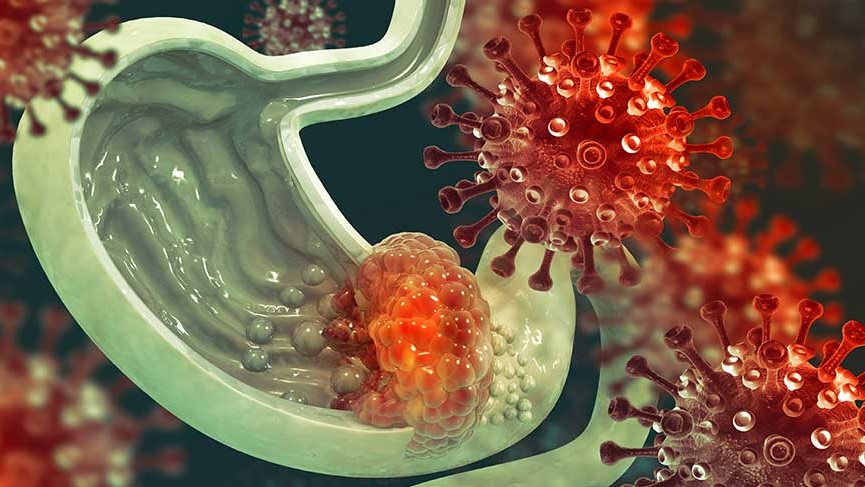Ulcers are open sores that develop on the lining of the digestive tract. They can be painful and disruptive to daily life. While ulcers can occur in various parts of the digestive system, the most common types are:
- Peptic ulcers: These ulcers form in the stomach (gastric ulcer) or the first part of the small intestine (duodenal ulcer).
- Esophageal ulcers: These occur in the lower part of the esophagus, the tube that connects your mouth to your stomach.
This article delves into the world of ulcers, exploring their causes, symptoms, diagnosis, and treatment options.
Causes of Ulcers
Several factors can contribute to the formation of ulcers. Here’s a breakdown of the leading causes:
- Helicobacter pylori (H. pylori) infection: This bacterium is the most common cause of peptic ulcers. It lives in the mucus lining of the stomach and duodenum, weakening the stomach’s protective barrier and allowing stomach acid to damage the tissues.
- Nonsteroidal anti-inflammatory drugs (NSAIDs): These medications, such as aspirin, ibuprofen, and naproxen, can irritate the stomach lining, increasing the risk of ulcers, especially with prolonged use or high doses.
- Excess stomach acid: Certain conditions or lifestyle factors can lead to excessive stomach acid production, which can erode the stomach lining and cause ulcers.
Symptoms of Ulcers
Ulcers may not always cause symptoms, but when they do, they can be quite uncomfortable. Here are some common signs to watch out for:
- Burning or gnawing pain in the upper abdomen: This pain is often described as a burning sensation and can worsen on an empty stomach or at night.
- Indigestion: Feeling bloated, full, or uncomfortable after eating can be a sign of an ulcer.
- Heartburn: A burning sensation in the chest, often caused by stomach acid backing up into the esophagus.
- Nausea and vomiting: These can occur with ulcers, especially when they are severe.
- Loss of appetite and weight loss: Ulcers can make eating uncomfortable, leading to weight loss.
- Dark stools: In some cases, ulcers can bleed, causing stools to appear dark or tarry.
Diagnosis of Ulcers
If you experience persistent symptoms suggestive of ulcers, consulting a doctor is crucial. They will usually conduct a medical history review, focusing on your symptoms and any medications you take. Diagnostic tests may include:
- Upper endoscopy: A thin, flexible tube with a camera is inserted into your esophagus and stomach to directly visualize the ulcers.
- Barium swallow: You swallow a chalky liquid that coats the digestive tract, allowing X-rays to reveal abnormalities like ulcers.
- Blood tests: These can sometimes detect the presence of H. pylori infection.
Treatment Options for Ulcers
Fortunately, most ulcers can be effectively treated. The specific treatment approach depends on the cause of the ulcer. Here are some common options:
- Treating H. pylori infection: Antibiotics are typically used to eradicate H. pylori bacteria, significantly reducing ulcer recurrence risk.
- Reducing stomach acid: Medications like proton pump inhibitors (PPIs) can significantly reduce stomach acid production, promoting ulcer healing and preventing further damage.
- Lifestyle changes: Quitting smoking, limiting alcohol intake, managing stress, and maintaining a healthy diet can significantly aid ulcer healing and prevent recurrence.
- Medications to protect the stomach lining: Certain medications may be used in specific cases to protect the stomach lining from damage caused by stomach acid.
Living with Ulcers
While ulcers can be uncomfortable, they are treatable. With proper diagnosis and treatment, most people with ulcers can experience significant relief and manage their condition effectively. Here are some tips for living with ulcers:
- Follow your doctor’s treatment plan: Adherence to medication schedules and lifestyle modifications prescribed by your doctor is crucial for healing and preventing recurrence.
- Manage stress: Stress can worsen ulcer symptoms. Explore relaxation techniques like yoga, meditation, or deep breathing to manage stress effectively.
- Maintain a healthy diet: Eating smaller, more frequent meals can help reduce the burden on your stomach. Choose healthy foods like fruits, vegetables, and whole grains while limiting spicy, greasy, or acidic foods that may irritate the ulcer.
- Avoid smoking and alcohol: Smoking and excessive alcohol consumption can worsen ulcer symptoms and hinder healing. Consider quitting smoking and limiting alcohol intake.
Remember: Early diagnosis and proper treatment are key to managing ulcers effectively. If you suspect you have an ulcer, don’t hesitate
